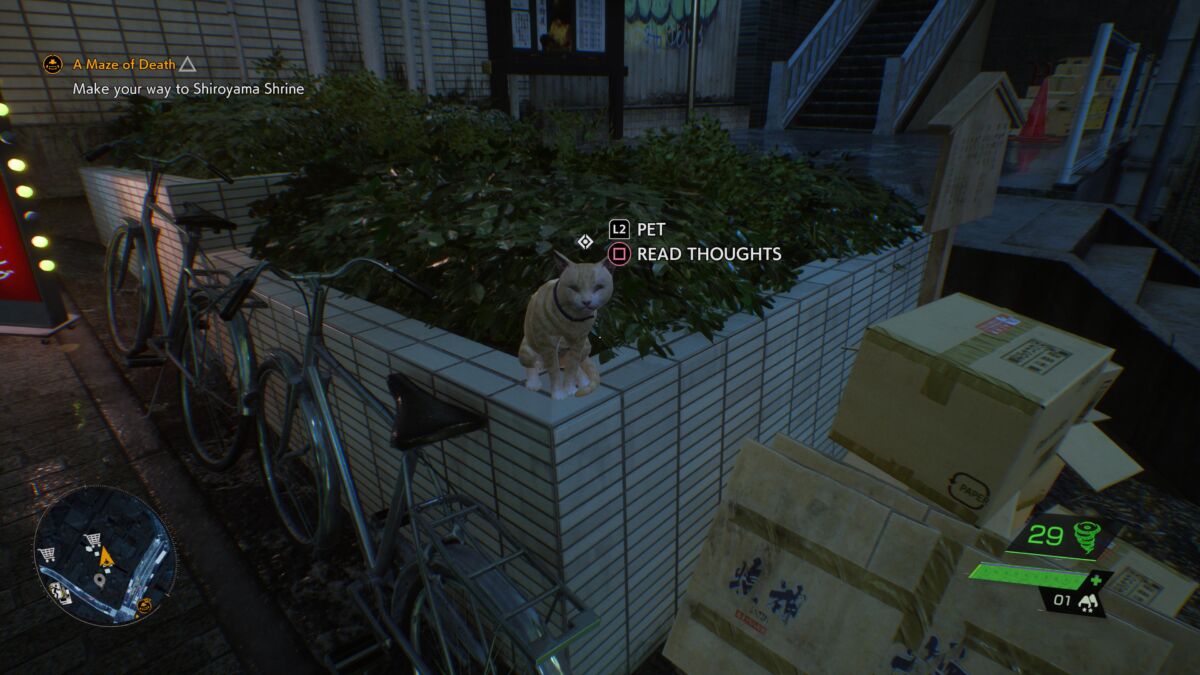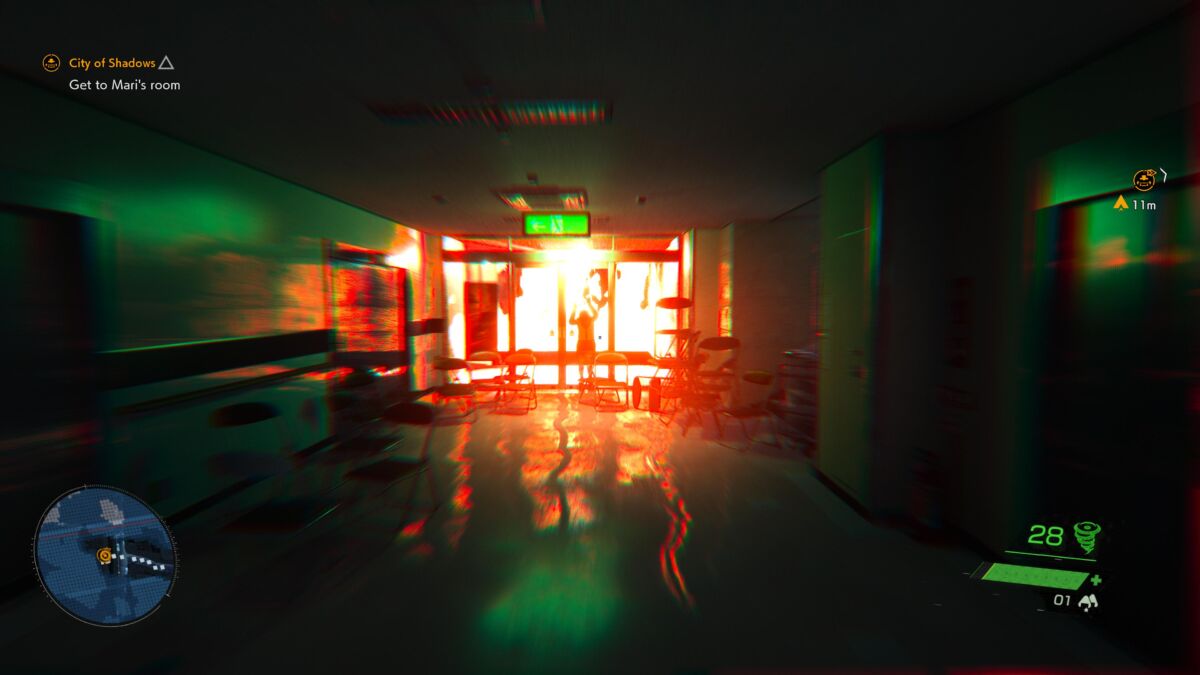Ghostwire: Tokyo is unlike anything else out there. Yes, it maybe shares a few too many design threads with open world games of the early 2010s at times, including a rather glacial “opening” of said open world, but as much as I rack my brain, it’s impossible for me to pigeonhole it as one key thing. Is it a horror game? Is it an FPS? Is it Lethal Weapon meets Yu-Gi-Oh? Ghostwire is all of those things and more, but one keyword will keep popping up again and again as more people encounter its wacky brilliance: it’s weird. But is it worth buying?
You play as Akito, a young man who’s possessed by a benevolent spirit called KK in the midst of a “rapture” in Tokyo by a man in a mask named Hannya. Everyone is turned into floating spirits, with the Visitors being left behind to trawl the streets instead. These Visitors are Ito-esque abominations, with you having to use your newfound magic to shoot spells out of your fingers before you reach inside their wretched bodies and tear out their cores. Oh, and also you can buy arrows from floating cats, give dogs food so they will take you to see nice spirits, and pass someone stuck in limbo some toilet paper so they can move on to the afterlife.

I did say it was weird. But beneath its wonderful eccentricity, there’s also real substance, even if it doesn’t quite balance exploration with progress all that convincingly throughout.
Most of your time with Ghostwire will be spent unlocking torii gates to open up more areas of Tokyo so that you may eventually reach the big bad. This isn’t necessarily a bad thing, as it does mean that you take on Ghostwire’s fairly dense world bit by bit, yet it does feel very odd, if not constrictive to be corridored in such a way when so many of its peers have so much to discover almost immediately. Ghostwire’s closed off world is my main qualm with the game, which is made even more of a shame when its depiction of Japanese society is this inviting to be in.

Ghostwire: Tokyo is quite honestly one of the best depictions of a city ever committed to a video game, so much so that it’s almost a pity there are so few NPCs. The level of detail is beyond impressive, with the disquieting emptiness of the game’s many regions somehow all still feeling lived in, like you could really imagine people going about their day-to-day in this world. There are remnants of normal life everywhere, including the clothes that people got yoinked out of, but everything feels real, whether that’s the food in a convenience store or the swings at a local playground. The best example, though, is the famous Shibuya Scramble Crossing at its quietest ever, yet somehow still humming with life. What Tango Gameworks have achieved here reminds me of The Getaway’s reflection of London way back in 2002, though infinitely more impressive. Twenty years of technological evolution will do that, though Tango’s artistic vision also cannot be denied.
That unique vision is clear in Ghostwire’s combat, which you get the sense won’t be to everyone’s tastes. Just like the opening up of Ghostwire’s world, getting to a good combat flow takes quite some time. You’ll start off with weak, slow, and basic wind attacks that feel like shooting the world’s heftiest M1 Garand, before eventually unlocking the ability to hurl fireballs to do huge damage and send out waves for crowd control. You can upgrade these skills over time to hit harder and faster, though anyone wanting absolutely chaotic, edge of the seat action may be left disappointed — I was expecting to unlock a dash mechanic at some point, but it never came. This gives Ghostwire’s combat its own slower, more methodical identity rather than Tango cribbing notes from their action peers at Bethesda, but it does also mean that you don’t feel nearly as empowered as you might like. You’ve got a spirit inside you that gives you magic powers, yet Ghostwire never goes “full anime” with that potential.

It’s good, then, that Akito and KK have such a likeable camaraderie that gives them a peculiar buddy cop dynamic — imagine if Yami Yugi was constantly bickering with Yugi Muto and you have the right idea. The generational gap between the pair often leads to funny, charming conversations, with KK coming across like a grumpy yet well-meaning uncle. Their conversations also do a lot to highlight the disconnect in Japanese culture between the young and the old, with shifting technologies and priorities causing them to be two completely different people who learn to respect each other more and more as the game progresses, despite those differences. Obviously, as someone who lives on the other side of the world in the Welshest of small Welsh towns, I’m not the best judge of how well Tango have represented the cultural and generational divide, yet it does feel like a fascinating window into modern Japan all the same.
Akito and KK’s journey can be a lot longer than the 10-15 hours quoted for the main story, as Tokyo is stuffed (perhaps excessively so) with side content to complete and collectibles to find. There’s relics, which are glimpses into Japanese history that are actually rather fascinating, Jizo Statues to bless you with extra uses of your spells, and various side quests given to you by spirits, some of which have been drawn from stories told to the developers themselves. While that adds a unique flavour to these side distractions, the really inconsistent rewards for completing them takes just as much away. Some quests give you tonnes of currency and special outfits, whereas others give you the almost the same amount of money that you can find in a dumpster around the corner and just don’t feel all that compelling.

Elsewhere, players can hunt down tanuki that are hidden in everyday objects and collect KK’s Investigations Notes for skill points that can be put towards adding to and improving your abilities. It must be said, though, that apart from gaining the ability to use a tengu to reach high places at will and making you feel less undercooked in battle, Ghostwire’s progression system leaves a lot to be desired.
There really isn’t much of note that makes the grind worth it, especially as so many of your unlocks are so situational and you also have to collect another resource called magatama to unlock new powers on top of those aforementioned skill points. It’s a lot of effort for what feels like scant reward at times, which, when combined with just how oppressively busy with various icons the map becomes over time, makes Ghostwire: Tokyo feel a bit bloated, despite the fact that it’s on a smaller scale than a lot of its open world contemporaries.

Speaking of contemporaries, Ghostwire: Tokyo is coming out at a very challenging time, with many of us still likely trying to catch up on our open world backlog. Elden Ring has dominated the conversation all year long, while Horizon Forbidden West and Dying Light 2 have also enjoyed plenty of the spotlight. Then there’s Forza Horizon 5, Far Cry 6, Halo Infinite, and Lost Judgment from the back half of 2021. That’s a lot of open world games in a short space of time, and as someone who’s played the majority of them, I’m more than a little burnt out, especially when Ghostwire falls into open world design habits that Elden Ring has made not feel antiquated as such, but just not quite as interesting.
Ghostwire: Tokyo is certainly a good game with plenty to like and its own unique DNA, but is “good” enough? I’m not so sure, at least right now in the middle of almost unprecedented release congestion, but it definitely deserves an audience, whether that’s at release or over time as its cult status grows. After all, any game that lets you read the thoughts of dogs has to be worth at least some of your time.
A PS5 Deluxe Edition key was provided by PR for the purposes of this coverage.
Some of the coverage you find on Cultured Vultures contains affiliate links, which provide us with small commissions based on purchases made from visiting our site.

